What is the president of the Brookings Institute’s thinking for an “endgame”? The recent escalation of the Ukrainian conflict has been accompanied by an escalation at Brookings with its positions urging greater US military involvement. In a series of strongly worded statements directed toward Vladimir Putin, Strobe Talbott takes hard lines and pushes for “lethal aid” that extends beyond the horizon…
Brookings’ and the Atlantic Council’s proposal recommending $3 Billion in “defensive” weapons and support for the Ukrainian government, delivered two weeks ago to US policy officials, garnered wide, front-page news coverage and remains an option as a negotiated cease-fire, due to be instituted today, is caught in cross-hairs and already in danger of failure.
Multiple political voices are coming out for an escalation policy, urging president Obama to deliver military ‘solutions’ on multiple fronts. Ukraine, Afghanistan, Iraq, Syria, Iran, Libya, Sudan, Yemen, Somalia, the list grows of countries hard-line Republicans and Democrats see as targets. Now, on the day a new Ukrainian peace agreement is to go into effect, a question for Brookings to address, at some point, is — “what is the endgame”?
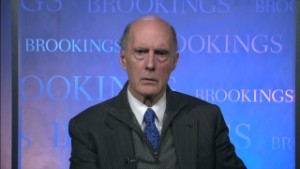 The Democrats who have, this past week, joined Republicans in advising several billion in lethal weapons would be an effective strategy should be asked about “endgames” and how they see the next stage of a US-Russian relationship on multiple fronts — as the US/Russian relationship is on multiple fronts and involves China, Iran, Iraq and mutual security interests that are far ranging.
The Democrats who have, this past week, joined Republicans in advising several billion in lethal weapons would be an effective strategy should be asked about “endgames” and how they see the next stage of a US-Russian relationship on multiple fronts — as the US/Russian relationship is on multiple fronts and involves China, Iran, Iraq and mutual security interests that are far ranging.
Endgames should be top-of-mind when policy proposals emanate that signal acts of war. The Brookings policy demands for immediate US arms to be delivered to the Ukraine, over objections by European allies, falls into this category. The tide of events in the Ukraine region after the collapse of the former government in Kiev, have steadily moved to push wider conflict. Russian moves, US and NATO moves, actions and reactions, are moving Europe and the world toward a new Cold War, a 2.0 version. The newly reconstituted Russia and a US stretched in far-reaching (“over-reaching”) national security policy commitments will both pay the costs for opening a new Cold War horizon.
The US 2001 authorization for the use of force (AUMF) is closing in on 15 years and is far from its initial Congressional intent. The administration’s newly proposed, revised AUMF is long overdue and addresses ISIL in the Mideast. Perhaps, given the newest developments, it needs to be revised to add the Ukrainian/European theater. War spending and war impacts are moving forward with and without AUMF, on multiple fronts, due to executive order. Presidential authority expands, as Congress rarely engages in the business of bringing wars to an end. In the Ukraine region, however one chooses to describe the ‘personality’ of the president of the Russian Federation, the current momentum is toward conflict and escalation.
Alternatives to escalation should be seen against a backdrop of nuclear capabilities and weapons described as “existential threats”. The return of a nuclear weapons regime in Europe, proliferation and “modernization” of warheads/missiles (e.g., B61-12), soon-to-be-deployed delivery systems (e.g., the F-35) and response systems, e.g., BZhRK to ‘deal with F-35s, should strike a particular concern, a ‘blip on the screen’ at the very least.
At Brookings, a policy of escalation of conflict, with resulting break-off of nuclear treaties, should resonate and, at the least, its next proposal for escalation should include the costs and risks of nuclear escalation, proliferation and such ‘exigencies’.
Brookings president Strobe Talbott wrote a book called Endgame. Let’s consider an endgame for a moment on the cusp of a flareup, now being described as the worst since the Cold War, between West and East, the US and European allies, the Russian Federation and its allies, most notably China, with whom it is no longer in an adversarial position as it was during the Cold War, but now is engaged in treaties and multidimensional alliance.
Let’s consider the geopolitical board circa 2015, as we read of recommendations from Brookings leadership to escalate now, before a next generation of modernized US weapons, led by the new F-35 with its ‘smart-guidance’ nuclear tipped missile due to arrive in NATO countries and deployed “in-theater” around 2020.
Before we look at the perspective of the Russian Federation security establishment, and its advice to its president on developments in progress that have potential to destabilize and escalate the risk environment, here are several recent posts from Strobe Talbott.
Again, as most all readers of this site know, Brookings resides near or at the top of Washington establishment think tanks. Its powerful position, access and policy roles are replete. Susan Rice, now National Security Advisor, came from Brookings. Strobe Talbott, the respected, long-time president of Brookings, formerly served as President Clinton’s Deputy Secretary of State, responsible for Russian affairs and nuclear arms reduction talks, this after his award-winning career as diplomatic correspondent for Time Magazine and writer of a number of books on US-Russian relations.
Given Strobe’s background and his role in having been instrumental in negotiating the nuclear weapons disarmament in the 1990’s as the Cold War was winding down, why is former-ambassador Talbott escalating at this level, as captured here, here, here and here:
As we observe the level of Strobe Talbott’s public reaction to events in the Ukraine, let’s turn to a Russian point of view, beginning with a widely distributed online news piece:
http://sputniknews.com/military/20150214/1018271166.html
The positions of the Russian Federation and its president, whose public polling number are residing in the 80% approval arena if one accepts the validity of Russian polling, indicate substantial public support. Despite sanctions, the drop in oil export revenue, petrol politics, and economic recession are exerting a toll, the Russian people are not backing off their support for a newly reconstituted Russian position — in Europe and the world. Many observers have written that it would be a mistake to think ‘pressure from outside’ will bring a collapse of popular support for positions the Russian people have about their role in an international sphere. A re-calculated “sphere of influence” is a reality, however a revitalized Russia is a project in the works and one does not have to go far to see this on the ground reality. Recent nuclear/energy deals Russia has culminated with China, India and Egypt and its role with Iran give ample evidence of this. What some might describe as “paranoid”, others might describe as the Russian people attempting to find a new direction as a powerful (and nuclear armed) nation.
Again, as most know, the history of the Russian people and its place as a powerful force in war is a matter of record, not opinion. One would be remiss, seriously remiss, not to consider World War II and the Russian history, prevailing after losing 20 plus million people, having much of its landscape devastated, and then rebuilding with a now abandoned state socialism model, which failed in meeting basic needs and human rights.
One sees attempts to move beyond the political limits of its past as a mixed economy and political system still in the process of finding its way. The on-the-ground reality, speaking to a realistic perspective in viewing the Russian Federation, is its armed forces remain powerful and its remaining nuclear weapons, after a two-decade process of weapons reduction, remain in a stand-off with the US and a Europe’s nuclear forces (Brookings speaks of 8000 plus strategic-tactical nuclear weapons still poised in the Russian arsenal.) Increasingly, the Russian economic-military relations with China, with whom it has culminated a series of strategic energy agreements vital to both countries security, provide a security regimen that both countries are pursuing. These developments go to strategic, not personal issues.
Following the current thread from Brookings president Talbott directed toward the Russian president, flinging words like “paranoid” into cyberspace, gives pause. Perhaps the president of Brookings has foreclosed options with president Putin, but the US would not be well advised to go this route. Isn’t it time the US open a new front that looks to a longer horizon, beyond the Ukraine? If so, what are US goals in the longer term? Begin by asking a hard stop question — what is the Russian endgame in Ukraine? Then, what is the US endgame in Ukraine?
If longer term US goals for resolution of geopolitical issues are projected forward, not the least of which are policies to resolve oil/gas conflicts, then diplomacy will serve a nation that needs less war spending, less debt, and shift to savings, investment, education and home-front productivity. Decades of war spending accelerated by a new Cold War with a China-Russia element, have problematic endgames. The potential for a flashpoint in a newly ice-free Arctic looms large, as disputing US-Russian claims grow over new resource rich territory and Pentagon planners address climate change and its effects on US security, even as Congress and resource rich interests act to deny evidence at hand. Politics aside, a bottom-line calculus suggests it is in larger US/global security interests to address larger geopolitical and environmental security issues before they rise to a critical nature.
Climate change is … reshaping the boundaries of the continents. Nowhere more so than in the Arctic, which is likely to become a major flashpoint in the territorial disputes and resource wars of the future. “The melting ice is opening a new ocean,” says Adm. Gary Roughead, who was U.S. chief of naval operations from 2007 to 2011. “It’s a once-in-a-millennium event.” Thirteen percent of the world’s undiscovered petroleum lies beneath the Arctic, as does 30 percent of the undiscovered natural gas and more than $1 trillion of mineral wealth. “The best way I’ve heard it explained,” says Rear Adm. Daniel Abel of the U.S. Coast Guard, “imagine if you have the Panama Canal and Saudi Arabia’s worth of energy show up at the same place in your area of responsibility. How would you embrace that?”
The near term suggests diplomacy, taking into consideration risks/costs of the Ukrainian ratcheting up to a full-blown 2.0 Cold War redux. Within a Strategic Demands cost/benefit calculus, let’s venture a guess as to what Russian goals are in the Ukraine. We see two vital goals from their point of view: 1) first strategic goal: an open, guaranteed corridor (thru the far east region of Ukraine, including Mariupol) to the port of Sevastopol, Crimea, allowing competitive trade routes south thru the Black Sea and giving the Russian Federation one warm water, secure port for its fleet, ‘blue water navy’ access to the Mediterranean and enabling a strategic goal of ‘protection of sea lanes’ and ‘projection of power’; 2) second goal: blocking NATO expansion, initiating Ukrainian constitutional federalism with guarantees of no “permanent NATO deployment” in Ukraine or return of nuclear weapons (on Russian’s “doorstep”).
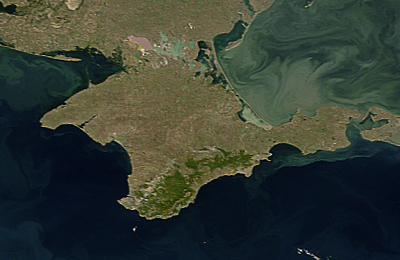
It would be revealing to see what the Pentagon intelligence is reporting on Russian strategic goals and we would venture that the Russian goals, if made public, would track along the lines above and serve as a basis for an agreement that is achievable.
The stated positions of Brookings that Putin wants a “failed state” in the Ukraine is questionable. Economics would seem to suggest that Russian reliance on oil exports demands that the oil pipelines to and thru the Ukraine to Europe are assets to be protected. It is in Russia’s (and Europe’s) economic interest that the Ukraine: 1) is capable of paying its debt to Russia and its purchases of oil/gas (it’s currently in default for oil/gas delivered and needs assistance to retire its debt.) Ukrainian economic performance and growth will act to grow the Russian economy. The two countries are economically deeply connected as are European countries economies connected. Sanctions due to the Ukrainian conflict have damaged every European country. Losses to the EU are reported from recent sanctions to be over 21 bn Euros; 2) It is in Russian Federation interest to have a country that is viable and ‘a non-adversarial neighbor’ without NATO deployments and next generation nuclear weapons on its border. A “failed state” will not accomplish economic or strategic goals.
Sometime the basics seem to be overlooked and mutual security needs neglected. This could be the case currently at the borders of East and West. Formerly, the nuclear stand-off during the height of the Cold War, led Europeans to demand withdrawal of US nuclear weapons and pull-back of Soviet nuclear weapons.
The peace movement, the newly established Green parties, the success of European re-building efforts anchored by the Marshall Plan and US economic wherewithal brought Europe back and then efforts to stop proliferation and reduce nuclear risks went forward. Strobe Talbott knows, perhaps as well as anyone, what is at stake if relations with Russia and Europe and the US disintegrate as China and its alliance with Russia is a formidable element in any full strategic calculus.The risk of risks in this equation is nuclear, including incentives for China to build-up its nuclear capabilities. Nuclear disarmament, adherence to current nuclear non-proliferation treaties, is an essential element to European, Russian-US-China and global security.
The US president last week acknowledged a “constructive” role Russia is playing in Iranian nuclear talks in this regard. The Russian-Iran relationship is deep and Russian cooperation, and follow-up on nuclear issues to prevent break-out from a likely forthcoming nuclear pact will be key after the conclusion of the talks.
The role that Russia played in the Mideast, to push Syria to abandon its bio/chemical weapons complex, which greatly benefited Israel’s security interests, is another on-the-ground fact that prevented war between the US and Syria and add to enlarging a conflict in the region. The counter-terrorism role Russia has in its alliances throughout the region, including Iraq where its opposition to ISIS is a key element in US strategy, needs to be addressed in any calculus of security and strategy. The myriad moving pieces in international security does not advise a new Cold War mentality as an approach that will act to any nation’s benefit.
As we consider the moving parts, players and looming issues on a much larger geopolitical, international, inter-related world, let’s return to Brookings where within its corridors and its public online web presence, there is disagreement on best strategies.
As president Talbott “follows” Jeremy Shapiro on Twitter, who is a Brookings scholar and Mideast expert, Shapiro puts out a public position that’s rare — he threatens his career standing (in our opinion) as he chooses to go up against the think tanks leadership and propose a ‘third way.’
As an aside, speaking of ‘third ways’, if memory serves us right, Strobe as a graduate student formerly lived with the president in London during the Vietnam era before Strobe obtained and published “Khrushchev Remembers“, which launched him into writing/reporting with Time Inc. A ‘third way’, apropos the former president, may be required again as we revisit the temper of the times that could deliver a 2.0 Cold War, nextgen nuclear weapons, abandonment of nuclear treaties and escalation of nuclear weapon capabilities. Few, apart from those in the weapons complex and war planners, would urge a return to the fear of nuclear stand-off with accompanying risks and costs.
In the near term, it would be good at this point in history for Brookings and its president to look at endgame scenarios and propose diplomatic ‘third way’ solutions and remedies that de-escalate the Ukrainian conflict and present an accompanying security horizon. The issues in Ukraine offer an opportunity for a larger set of security solutions. Leave the ad hominem, move to the broader, longer security board, and present mutual security solutions — for today and for tomorrow. Use the problem in the Ukraine to move forward not backward. A security architecture that does not bring withdrawal from hard-won treaties, including the Strategic Offensive Reductions Treaty (the “Moscow Treaty”) to cut deployed strategic nuclear warheads in the U.S. and Russia by two-thirds. To what extent will a new Cold War disrupt the series of treaties that have led to nuclear weapons reduction? Consider the sequence — SALT I (1969–1972), the ABM Treaty (1972), SALT II (1972–1979), the INF Treaty (1987), START I (1991), START II (1993), Moscow Treaty (2002) and New START (2010).
After NewStart was signed the question was asked: What’s next for US-Russian relations?
Before passing the ratification bill Tuesday, the Duma amended it to stress Russia’s right to withdraw from START if the US upsets the strategic balance with any major missile defense initiatives…
What would be next for US-Russian relations after the collapse of New START?
The legacy of Strobe Talbott’s profoundly important work to further negotiations and agreements to draw down nuclear weapons should not be lost in the current conflict and exchange of recriminations.
The position of Strategic Demands, regarding an endgame, is to pursue a strategy that is a ‘third way’, one grounded in history, a strategy that considers US security within a post-Cold War world with inter-connections and mutual security needs. Is nuclear re-armament to be a US strategic aim and, if so, what what was it that the Russians sought that the US could not negotiate?
Russian history has, as a central goal, security interests grouped around a warm water/blue ocean port at Sevastapol enabling economic access and future growth. Crimean history demonstrates this. Russian presence in the Crimea demonstrates this. Russian roots in the Ukraine are deep. As Ukraine goes through its political upheaval is a diplomatic solution do-able? Crimea and Eastern Ukraine’s self-determination in a federalized system that’s in negotiation would be a step toward a solution. Another step would be to address Ukrainian-Russian ‘corridor’ to Crimea, diplomatically arrived at, that guarantees future passage of economic goods through the contested Eastern Ukrainian Donbass territory. A bridge between Crimea and Russia across the strait of Kerch would act to address this. Economic development is not ‘appeasement’ or ‘accommodation’, it is a smart strategy that looks to mutual needs and security.
US/European security points to what is possible within a post Cold War framework. An integrated European economy and desire for mutual security within a larger reciprocal security environment have been the goals of the nations within Europe. This has been the current, to integrate, so integrate and provide guarantees of access and rights. The Brookings Institute and its associates, partners, government and non-government organizations would do well to look at win-win scenarios, beginning with a next iteration of a Ukrainian peace agreement.
Reference: Ukraine Crisis – Timeline
Reference: Reconsidering Russia/Crimea
§
Security Architecture “With Russia, without Russia, or against Russia — Next steps”
Reference re: ABM Treaty – US Withdrawal / 10th anniversary conference – Heritage Foundation – February 2013
Reference: US to deploy ABM systems in Europe / RT – December 2013
-=-=-=-=-=-=-=-=-=-=-=-=-=-=-=-=-=-=-=-=-
From Jeremy Shapiro @Brookings
An Alternative to Arming Ukraine / Feb 12, 2015
My recent post on why arming the Ukrainians is a bad idea occasioned quite a bit of criticism. After discarding the multitude of comments accusing me of either appeasement or Nazism (or both), the most consistent critique focused on the lack of an alternative. My Brookings colleagues Strobe Talbott and Steve Pifer threw down that precise gauntlet in their response.
Why arming the Ukrainians is a bad idea / Feb 3, 2015
§
How to Avoid a New Cold War / October 2014
Order from Chaos:
A new foreign policy blog at Brookings
February 13th, 2015 (Friday)
When I told a former colleague that Brookings was starting a foreign policy blog, his response was swift and brutal: “You are starting a blog … just when blogs have become passé…!?” Another colleague had an equally negative yet precisely opposite reaction: “I’m opposed to blogging. And tweeting. And every other phenomenon of the Internet era. I am in favor of copying manuscripts by candlelight in monasteries…”
A New European Security Order / Jeremy Shapiro
The Ukraine Crisis and the Missing Post-Cold War Bargain
-=-=-=-=-=-=-=-=-=-=-=-=-=-=-=-=-=-
Strobe Talbott on Russia’s Vladimir Putin and Contempt of the West
January 14, 2015
-=-=-=-=-=-=-=-=-=-=-
It is time to look at the bigger picture within a modern world connected by the world wide web, an Internet that delivers information in quantity and quality unlike the Cold War era.
Information-handicapped good and evil narratives of the fifties and sixties have given way to new ways of seeing, with free flow of information across borders with new visions of security in the 21st century that redefine security in larger, multinational, even global ways.
The role of the US as a leader in this arena, an essential arena, is being challenged by regional and religious carry-overs from previous eras. A 2.0 version of the Cold War will be seen in the context of the world wide Internet and ‘struggle for hearts and minds’ much different than the decades after World War II.
Let’s try new solutions in the 360° connected world where most everyone now has access to the Net. Let us attempt to redraw our strategic policy though lessons learned and urge ‘think tanks’ to go beyond old verities, ultimatums and political givens. An endgame that produces a collapse of the START treaties and renewed nuclear proliferation is not in the security interests of the US, Russia, Europe or any nation.

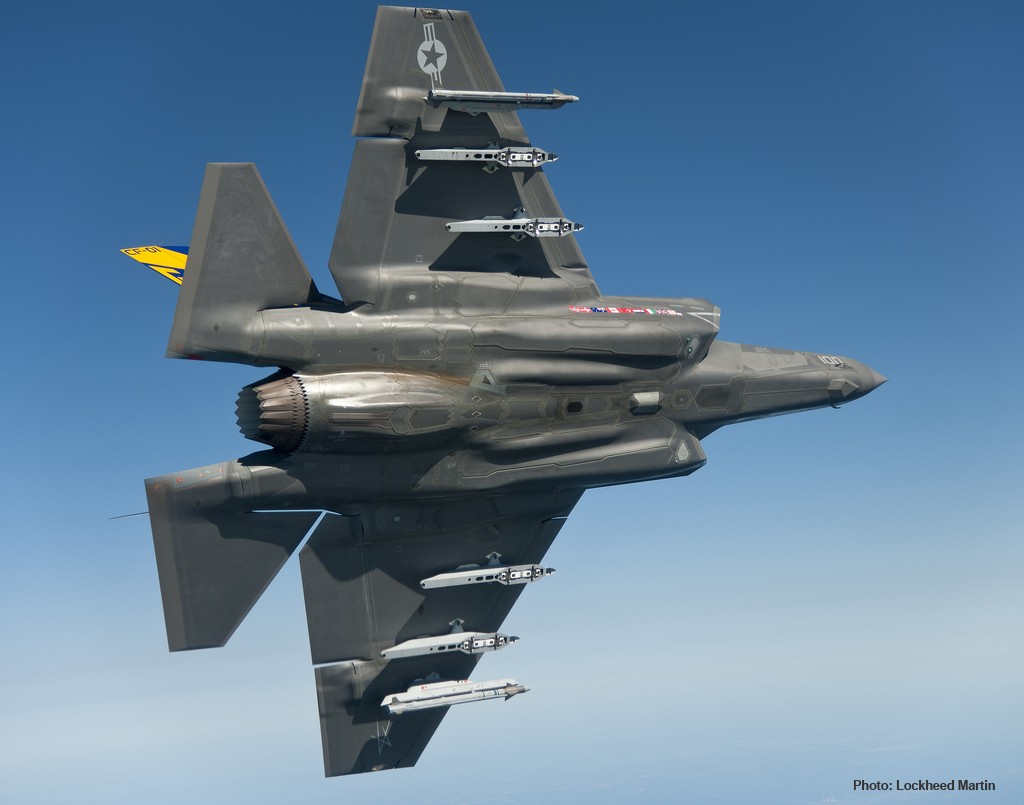

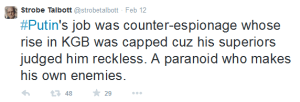
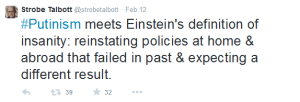

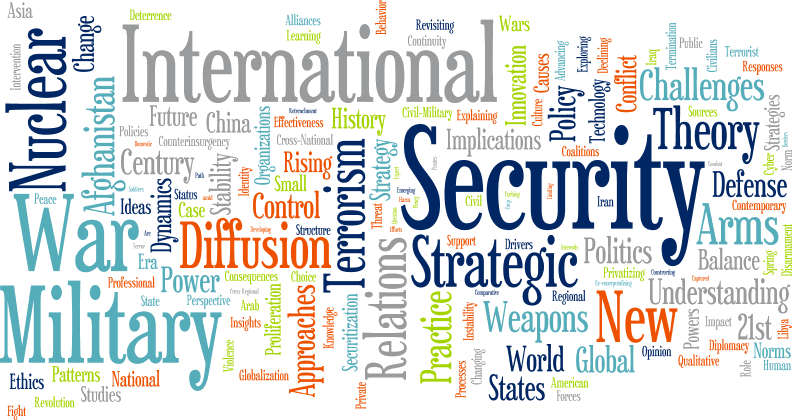

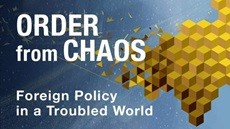
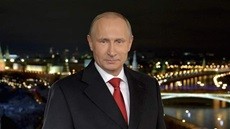
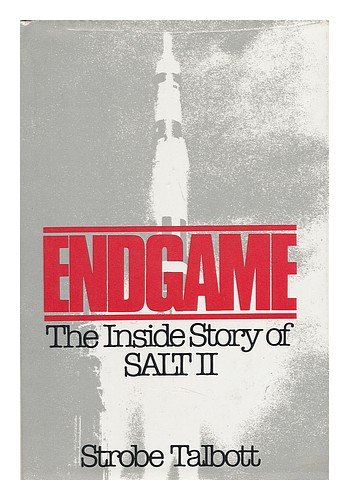


Making Ukraine a NATO Member Almost Puts US at War With Russia
After the fall of Berlin Wall and dissolution of the Warsaw Pact, NATO found itself obsolete, as an imminent threat of communism in Europe was gone.
The large bureaucratic machine, which NATO has become, needs the enemy – perceived or real – to justify its existence and billions of dollars of military spending. This is why Ukraine has become such an important gimmick for NATO. If the alliance manages to get involved in Ukraine and have a military confrontation with Russia, NATO will find itself back in action and subsequently more funds will flow into the organization’s budget…
Following the collapse of Soviet Union, NATO has spread eastward, expanding along a line from Estonia in the north to Romania and Bulgaria in the south. Currently, Russia’s only buffer zones to a complete NATO encirclement on its western border are Finland, Belarus and Ukraine. At first, Russia was calm about the expansion of NATO; however, when the organization decided to bring Georgia and Ukraine into the alliance, it has certainly crossed the red line, Le Point reports.